

Lessig_FOI.pdf (Objet application/pdf) The Future of Ideas. The Future of Ideas: The Fate of the Commons in a Connected World (2001) is a book by Lawrence Lessig, at the time of writing a professor of law at Stanford Law School, who is well known as a critic of the extension of the copyright term in US.[1] It is a continuation of his previous book Code and Other Laws of Cyberspace, which is about how computer programs can restrict freedom of ideas in cyberspace.
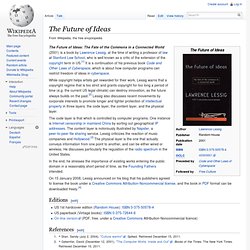
While copyright helps artists get rewarded for their work, Lessig warns that a copyright regime that is too strict and grants copyright for too long a period of time (e.g. the current US legal climate) can destroy innovation, as the future always builds on the past.[2] Lessig also discusses recent movements by corporate interests to promote longer and tighter protection of intellectual property in three layers: the code layer, the content layer, and the physical layer.
The code layer is that which is controlled by computer programs. Editions[edit] References[edit] External links[edit] Larry Lessig : Ré-examiner le remix. Students for Free Culture. "An Incredible Soul": Lawrence Lessig on Aaron Swartz After Leading Cyberactivist's Suicide. 1 of 2.
Lawrence Lessig : Nous, le Peuple et la République que nous devons réclamer. SiSU manifest: Free Culture - How Big Media Uses Technology and the Law to Lock Down Culture and Control Creativity. Larry Lessig affirme que la loi asphyxie la créativité. == Free Culture == Free Culture (book) Free Culture: How Big Media Uses Technology and the Law to Lock Down Culture and Control Creativity (published in paperback as Free Culture: The Nature and Future of Creativity) is a 2004 book by law professor Lawrence Lessig that was released on the Internet under the Creative Commons Attribution/Non-commercial license (by-nc 1.0) on March 25, 2004. duration (from 32 to 95 years),scope (from publishers to virtually everyone),reach (to every view on a computer),control (including "derivative works" defined so broadly that virtually any new content could be sued by some copyright holder as a "derivative work" of something), andconcentration and integration of the media industry.
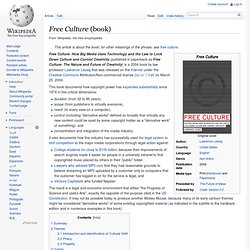
It also documents how this industry has successfully used the legal system to limit competition to the major media corporations through legal action against: This book is an outgrowth of the U.S. Supreme Court decision in Eldred v. Ashcroft, which Lessig lost. Free Culture covers the themes of Piracy and Property. Lawrence Lessig. Lawrence "Larry" Lessig (born June 3, 1961) is an American academic and political activist.
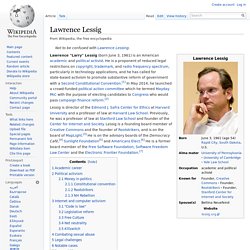
He is a proponent of reduced legal restrictions on copyright, trademark, and radio frequency spectrum, particularly in technology applications, and he has called for state-based activism to promote substantive reform of government with a Second Constitutional Convention.[1] In May 2014, he launched a crowd-funded political action committee which he termed Mayday PAC with the purpose of electing candidates to Congress who would pass campaign finance reform.[2] Lessig is director of the Edmond J. Safra Center for Ethics at Harvard University and a professor of law at Harvard Law School. Previously, he was a professor of law at Stanford Law School and founder of the Center for Internet and Society. Academic career[edit] Interview with Lawrence Lessig in 2009 Lessig started his academic career at the University of Chicago Law School, where he was Professor from 1991 to 1997.
Political activism[edit] Lawrence Lessig: Rooting out Corruption in Politics: Complicity and Complacency by the Media – ibiblio. March 4, 6:30-8:00pm UNC School of Law Rotunda The Fourth Estate: What is journalism’s role, and where has it been in the face of outside interestes influencing the way our government is run?
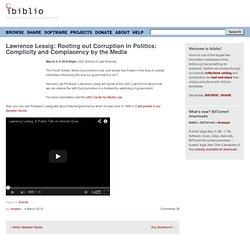
Harvard Law Professor Lawrence Lessig will speak at the UNC Law School about how we can restore the faith that journalism is a trustworthy watchdog of government. For more information visit the UNC Center for Media Law. Rootstrikers. Lessig.org. Lessig Blog, v2. On Tuesday, Berkeley City Council adopted unanimously an ordinance inspired by Councilman Max Anderson, and which I and Robert Post helped craft.
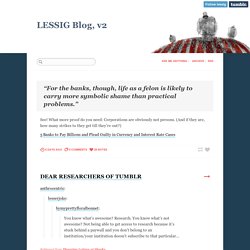
I was very happy to bat cleanup in an effort that has been underway for years. But there’s some serious misunderstanding about the ordinance and its purpose. No doubt many of the people fighting for the ordinance have a firm belief that non-ionizing radiation presents a significant and underappreciated health risk. Those people believe this for different reasons. Some believe it because of personal experience: The letter from the mother who lost a daughter who carried her cellphone in her bra, and who then was discovered to have four cancerous lumps perfectly mirroring where her phone had been carried, is a letter from someone who believes this because there’s no other way for her to understand her loss.
These are all people who believe there is a risk that is not yet acknowledged. I am not a scientist. Likewise, here’s the Blackberry statement: